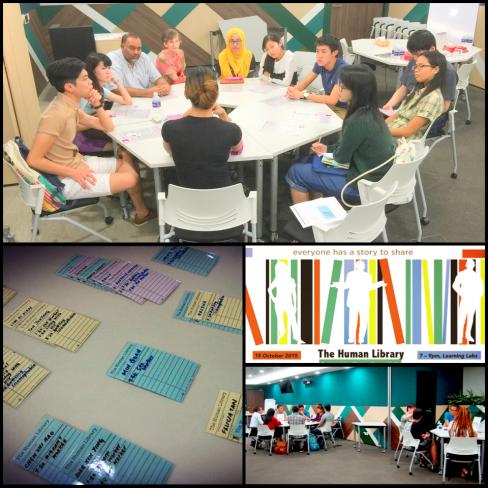
by Christine Pelly and Pat Meyer
That evening we came to the library curious and left enriched. It is said that the process of reading is a transactional one between the written word and the reader. But by engaging with the human books, this transaction took understanding and experience to another level.
Five tables were set up, each with an interesting “book”—a person ready to share their life story. “Readers” sat together around the tables, leaning in, listening and nodding, bringing up topics and questions in a safe space—asking questions that they may have wondered about, but never had an opportunity to talk about with someone who has first-hand experience,
We “read” three of the human books. Each of them has faced discrimination for who they are—it has affected the jobs available to them and how they live.
Avin, who has lived with HIV for five years, shared with us the process of realisation and acceptance of his condition. He has had to pay a heavy price in lost relationships but has come to accept this reality, this new normal in his life. This acceptance came when it dawned on him that there was more to himself than HIV. The essence of Avin was not lost in this condition called HIV; to make HIV all there was to him was an injustice. With this realisation Avin has gone on to be an advocate for those living with HIV. When he described his “coming out” with his parents, and the depth of his relationship with his mother, it made the point of how important it is to have that one person who stands by you, through good times and bad. When asked if there was one thing he would like others to be aware of in their interactions with those who have HIV, Avin suggested—Take it slowly, the person is already dealing with so much. Understandably, we would have lots of questions, but we should give space to the person going through the traumatic experience of being HIV positive. Take it slowly.
Satish, a well-spoken young man who does not fit the stereotypical image one has of a low-wage foreign worker, told us his story. He came to Singapore from India to earn a living and provide for his family. A life-threatening workplace injury has now jeopardised his plans and hopes for the future. Over a year later, he is waiting for his medical treatment to conclude and for injury compensation. Despite the setbacks and the uncertainty that is now his reality, Satish has found ways of making meaning of his life. He volunteers with TWC2, supporting and guiding other workers in circumstances similar to his own. In a situation where so much of his life has not been in his control, Satish has sought to empower himself.
Sherry, a transgender sex worker, was book number three. The challenges she has faced would have broken a lesser person. Her life has been complicated by issues of identity and by being misunderstood and treated in ways that have demoralised her. Sadly, it came across that being a sex worker was not so much a matter of choice but a way of life that has been forced upon her. It was interesting that her time in national service was not the ordeal we listeners thought it would have been. Instead, Sherry found more acceptance and understanding there than in the society to which she returned after national service—a society where it was difficult to get a job, where she is often seen in a derisory light, and where she works in dangerous, vulnerable circumstances.
Like Avin and Satish, Sherry, too, has sought to get back some measure of control over her life. She works with Project X where she supports and educates sex workers about their rights. However, Sherry’s choices in life seem to be more constrained and limited compared to Avin and Satish. To that extent, of the three human books, the sex worker book was the most poignant narrative.
Our interaction with the human books was an enlightening experience. At times it was unsettling as we were brought directly into the “text” of the human book, where the challenges and harshness of people’s lives were made real. But what stays long after the event is the strength and resilience of the human spirit that Avin, Satish and Sherry embodied. Even in the most challenging of situations, with strength and positive attitudes, they are helping educate others in their situation and in society at large.
The writers are volunteers with TWC2.
Keep in touch with events happening at Li Ka Shing Library, via our Facebook page.